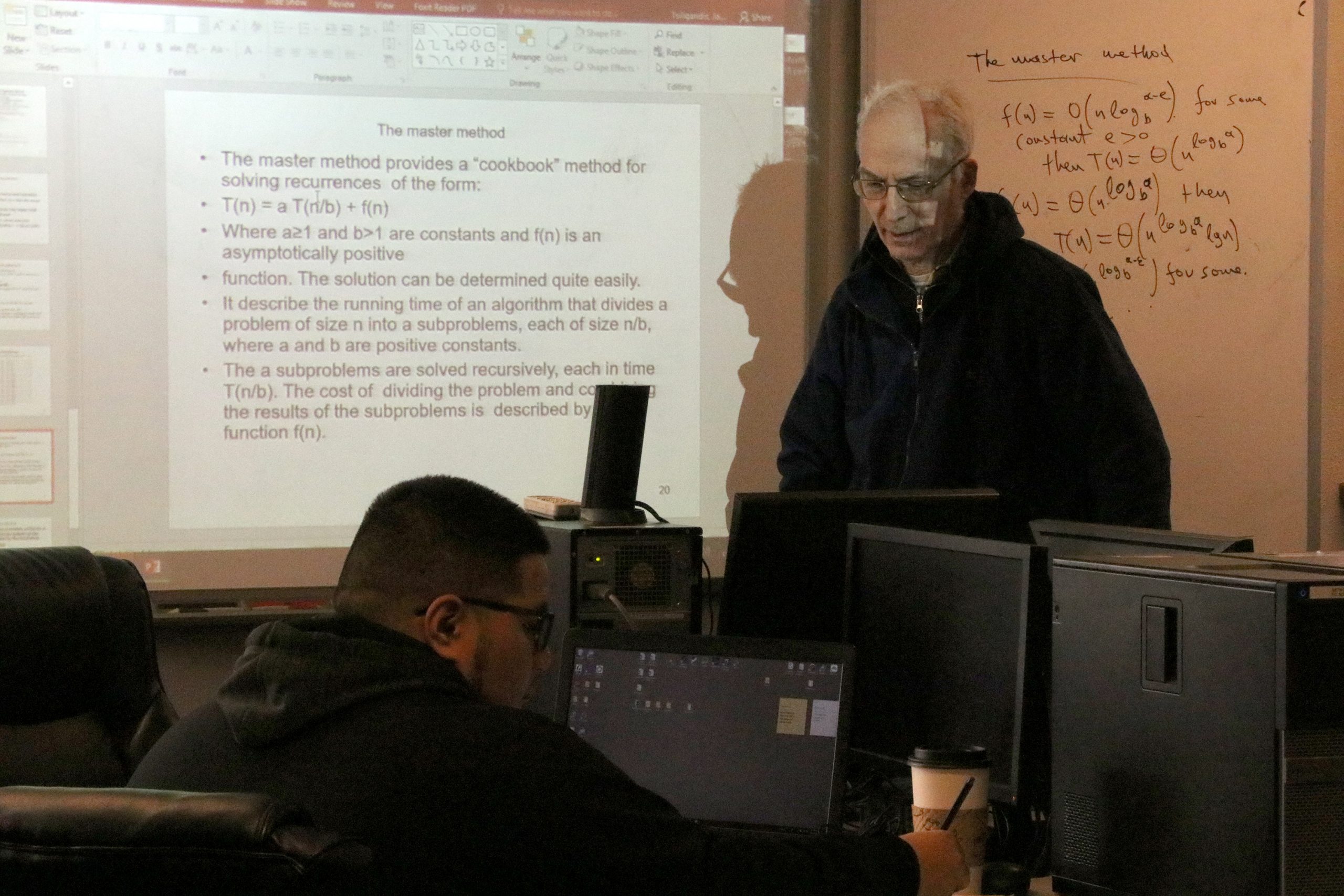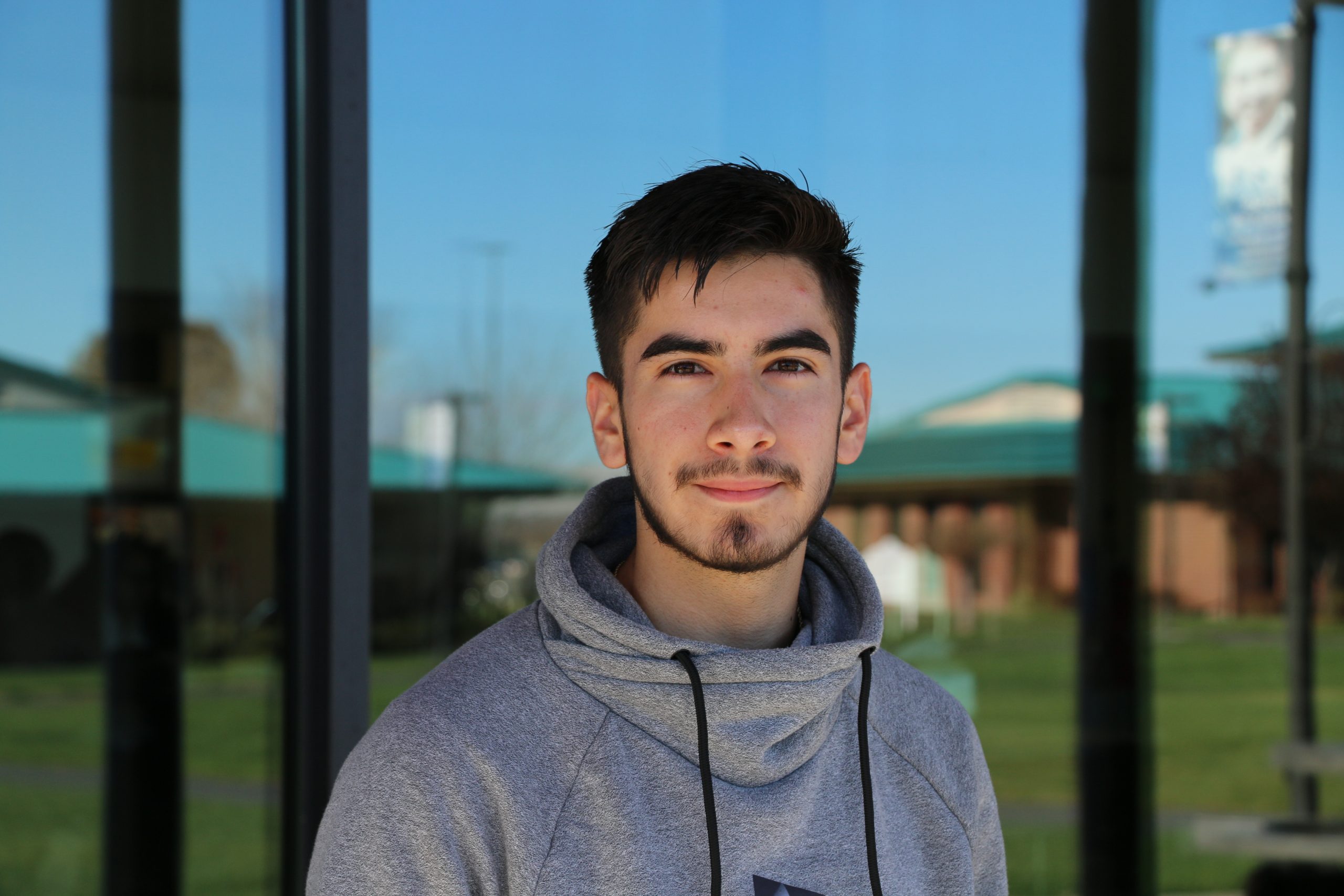Computing Success
Computing Success
Computer science students garner national attention for their research in algorithms
From the time he was 15 years old when his grandmother bought her first laptop, Heritage senior Daniel Cruz has loved computers.
After devouring all the classes and robotics opportunities he could get his hands on in high school, choosing a computer science major at Heritage University was a natural for Cruz.
The same was true for Manuel Anaya.
“I just knew I wanted to be in computers,” Anaya said. He came to Heritage in fall 2018 on a full scholarship through the Moccasin Lake Foundation.
Both Cruz and Anaya stand out for their passion and their work ethic – something computer science professor John Tsiligkaridis, Ph.D., looks for in his students. It’s why he urged both of them to complete research projects and to present that research at academic conferences.
Last summer, the pair worked with Tsiligkaridis researching algorithms and a program to access data more easily. They submitted their work for presentation consideration at the Annual Biomedical Research Conference for Minority Students (ABRCMS) and were among those selected to present in the Computational and Systems Biology. In November, they presented A Projection Tree Algorithm and the Incremental Neural Network virtually.
NEVER STOP LEARNING
It’s a recognized fact at Heritage that small class sizes mean Heritage students get a lot of one-on- one attention from instructors. This is especially true with computer science, where the instructor-to- student ratio is about one to 10.
Tsiligkaridis isn’t just a great teacher, said his students. He’s their guide, their mentor and their biggest cheerleader. He regularly shares opportunities for them outside the classroom, urges their participation, and works with them all along the way.
“John always urges us to join clubs, do internships, go to conferences,” said Cruz. “With COVID here, he preferred us to do conferences.”
When Tsiligkaridis urged Cruz to go ABRCMS conference in San Diego in the summer of 2019, Cruz went. And when Tsiligkaridis encouraged Cruz to attend the conference virtually in 2020, Cruz again enthusiastically agreed.
“John always says if you stop learning over the summer, when you come back, you’re going to have forgotten things.
“He looks at what you like, and he pushes you toward certain fields – like for me, the medical field.”
Tsiligkaridis also encourages upper-level students to mentor younger students. He suggested Cruz work with Anaya, who’s a junior.
Like Cruz, Anaya was used to hearing Tsiligkaridis talk about extra projects. Anaya understood early on the importance of conferences in the computer science field.
As a sophomore, Anaya attended the INFORMS conference in Seattle, a large-scale operations research and analytics gathering.
For the most recent ABRCMS conference, Tsiligkaridis suggested the two students do research on algorithms and a program to access data more easily.
The students worked on it all summer, mostly separate from one another because of the pandemic. Tsiligkaridis would explain what they should do, and they’d start researching it. They wrote an abstract. They developed charts.
“We would show him our work, ask him for guidance, and he always gave us great feedback,” says Anaya.
MEANINGFUL OFFERINGS GO VIRTUAL
When an event that’s typically bursting with people from all over the world goes virtual, a lot of things change. The ways attendees experience the event are different, but the offerings remain the same. There are still inspirational keynote speakers and breakout sessions where attendees get a deeper look at cutting-edge research. Students still present their research, with top presenters earning awards. Most importantly, students still interact with their peers from colleges throughout the country, with faculty whose influence could lead
to opportunities with future research or graduate studies; and with leading scientists, programmers and industry professionals who can help connect them with careers after graduation. It’s just all done virtually.
“Even in a virtual situation, you still have speakers and hundreds of exhibitors from nonprofit organizations, grad schools, Ph.D. programs,” said Anaya. “There’s still tons of networking you can do – it’s just done on your screen.
“The experience was incredible,” he said. “It’s an exchange of information and ideas. It gives you a different perspective with these colleagues from around the world, places like China and India.
“I really got a sense of what I didn’t know,” said Anaya. “I gained a lot of knowledge on the subject we chose because we really had to hone in on it and become an expert on it. You go in knowing the basics, and then you have this experience, and it makes you want to learn more.”

John Tsiligkaridis, Ph.D. is one of his students’ greatest cheerleaders. He seeks out experiences that prepare them for their individual goals and often collaborates with them on research projects.
CONNECTIONS ABOUND
“I learned that everywhere you go, there are different types of people and personalities and always someone who knows more than you do who can guide you.
“You can get opportunities at conferences whether in person or virtual because all these people you’re coming in contact with have different backgrounds,” Anaya says.
“I’ve also learned there’s always more to computer science than what I used to think. There are so many different fields we can apply our work in.”
Both students want to be a part of a community where their expertise can help people. They have their ideas – perhaps a hospital setting, perhaps business.
They expect they’ll look to Tsiligkaridis for his guidance then, too – just as they’ve done so far.

